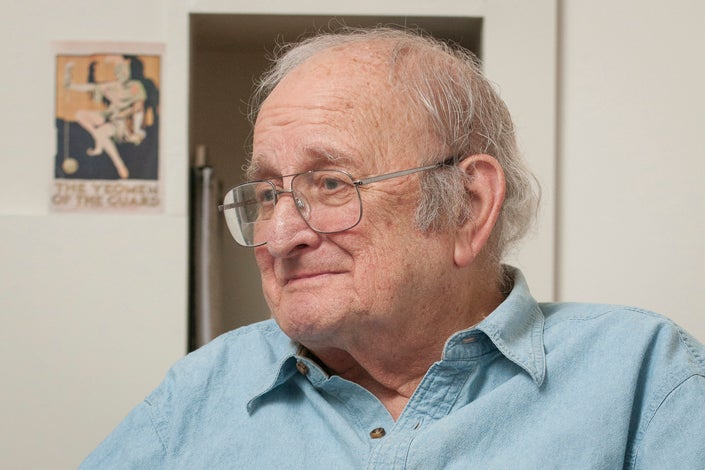Carl Weber, Stanford professor emeritus of drama and a protégé of director Bertolt Brecht, dies at 91
Carl Weber was a treasured mentor at Stanford, as well as a cutting-edge director who brought German experimental theater to America.
Carl Weber, the eminent director who brought German experimental theater to America, died in his sleep in Los Altos on Dec. 25. The Stanford professor emeritus of drama was 91.

Carl Weber, the eminent director who brought German experimental theater to America, was instrumental in creating Stanford’s dual-track doctoral drama program, which focuses on directing and critical theory. (Image credit: L.A. Cicero)
During the 1950s, the German director had been a protégé of Bertolt Brecht, one of the leading theatrical innovators of the 20th century. Weber was an important and seminal director, as well as a treasured mentor. Pulitzer and Tony Award-winning Tony Kushner (Angels in America), a former student, praised Weber as a “spectacular teacher.”
Weber came to Stanford from New York University in 1985 and continued teaching until 2013. However, his stint as a visiting director in 1963-64 meant that he had influenced the department even before he became a full-time professor, according to Branislav Jakovljevic, chair of Stanford’s Department of Theater and Performance Studies.
Weber was instrumental in creating the dual-track doctoral drama program that has received international recognition, with its special focus on both directing and critical theory, Jakovljevic said.
One former Stanford student, Tony Award-winning Judith Dolan, MFA ’73, PhD ’96, now on the drama faculty at the University of California, San Diego, recalled Weber as a “phenomenal idealist” who encouraged “artistic fearlessness” in his students: “He accepted you as you are, never talked down to you, never pulled rank. He would encourage argument. I suppose it comes from the Brechtian aesthetic, where argument is extremely important.”
Students recalled Weber’s dictum: “Don’t tell me what you like, tell me what you see.” It allowed students to bypass their wish to impress or please, or to avoid the worries about hurting a peer’s feelings. Brecht apparently felt the same way: He was known for bringing 12-year-olds to rehearsals and asking for their response. “They didn’t come with cultural baggage. It’s not a time to show off what you think,” Dolan said. Hence, Weber encouraged Dolan to bring her own young children to rehearsals.
Gregory Freidin, professor emeritus of Slavic languages and literatures, worked on the 2004 American premiere, under Weber’s direction, of Isaac Babel’s Maria at Stanford, which was attended by Babel’s two daughters and second wife, who praised the production.
“He had that kind of energy and grasp and unbelievable precision. You couldn’t make a false note without him noticing it,” said Freidin. He lauded Weber’s great artistic generosity and an “intellectual range that was quite incredible,” and also his relentless probing that made Freidin see Babel afresh.
“I was completely transformed by working with him. It was like discovering life on another planet,” said Freidin. “In terms of an art experience, it is probably the greatest gift I had ever received.”
Weber was born in Dortmund, Germany, in 1925. He began his theatrical career as a teenage soldier in a POW camp in Colchester, Essex, England. He and fellow prisoners would stage plays in the legendary camp. Among the other performers was future actor Klaus Kinski.
After the war, Weber’s life changed course when he saw Brecht’s Mother Courage, the production that launched Brecht’s famous Berliner Ensemble: “It is still to me the most impressive theater I have seen in my life,” Weber said in an interview in 2010. “It was a totally different kind of theater. Simply stunning. The way of acting was different, the staging was very different.”
Weber became Brecht’s assistant director in 1952 and then resident director of the company after Brecht’s death in 1956.
Weber directed productions in major theaters all over the globe, receiving Denmark’s Jylland Critics Award and two Off-Broadway Theater Awards, or Obies.
Weber translated and introduced avant-garde playwrights to the West, including Peter Handke, Franz Xaver Kroetz and Heiner Müller. He also translated, edited and wrote introductions and commentary to Müller’s poetry, plays and prose, and edited the anthology DramaContemporary: Germany. His translations of plays into German have been widely produced.
Another former Stanford student, Romanian actor and director Florentina Mocanu, PhD ’12, visited Weber on Christmas, just hours before his death, and remembered him as “sharp and curious, wanting to know all about everyone.”
Looking with him at a photograph of Brecht and his protégé, she suggested that Brecht had trusted Weber’s sensibility: “You had a way of seeing the world that he could not even imagine, a kind of respect and reverence for your talent and expertise that was beyond your young years.” Weber agreed.
Weber is survived by his daughter, actor and educator Sabine Gewinner-Feucht in Austria; his partner, film and television writer Inge Heym of Berlin; his son, Dr. Stefan Heym, and three grandchildren in Berlin. His wife, the German theater and film actress Marianne Rossi, died a decade ago.
A memorial is planned after the annual Carl Weber Lecture, from 6 to 7:30 p.m. Thursday, Jan. 19, at the Roble Studio Theater, 375 Santa Teresa Street.
